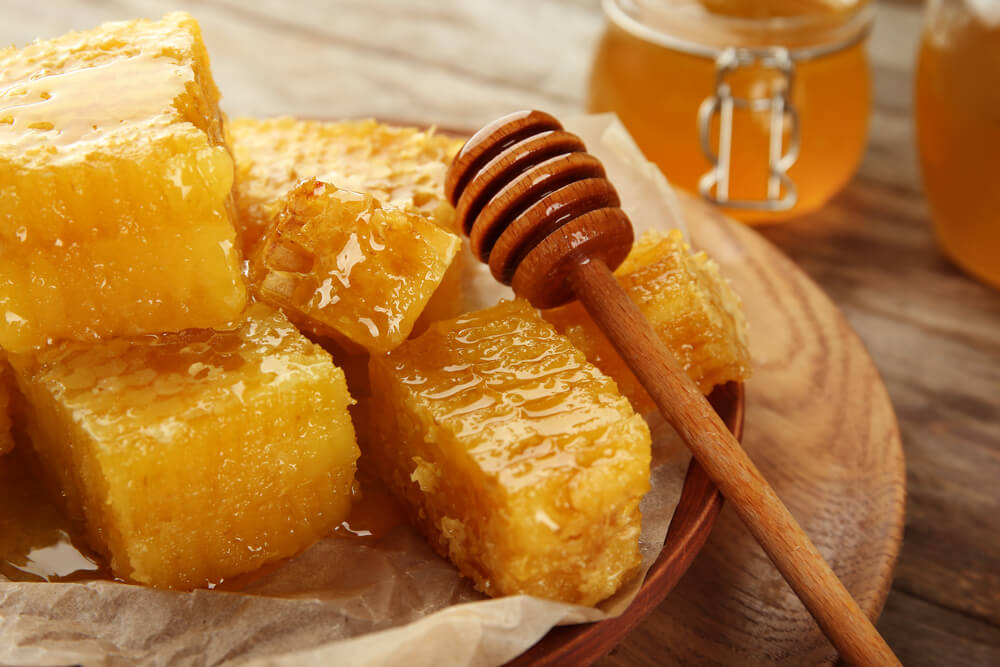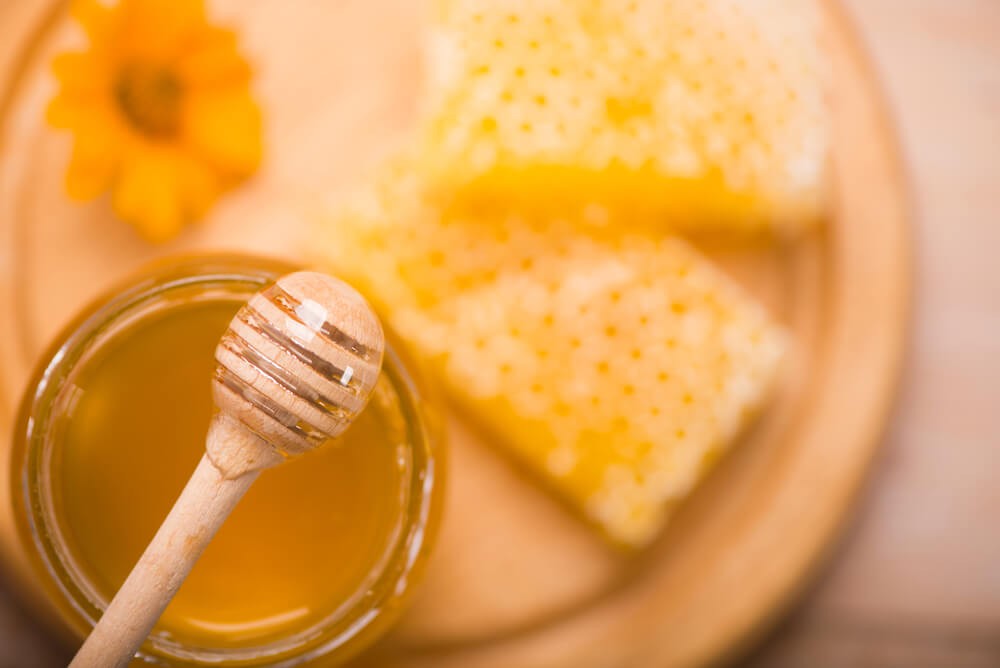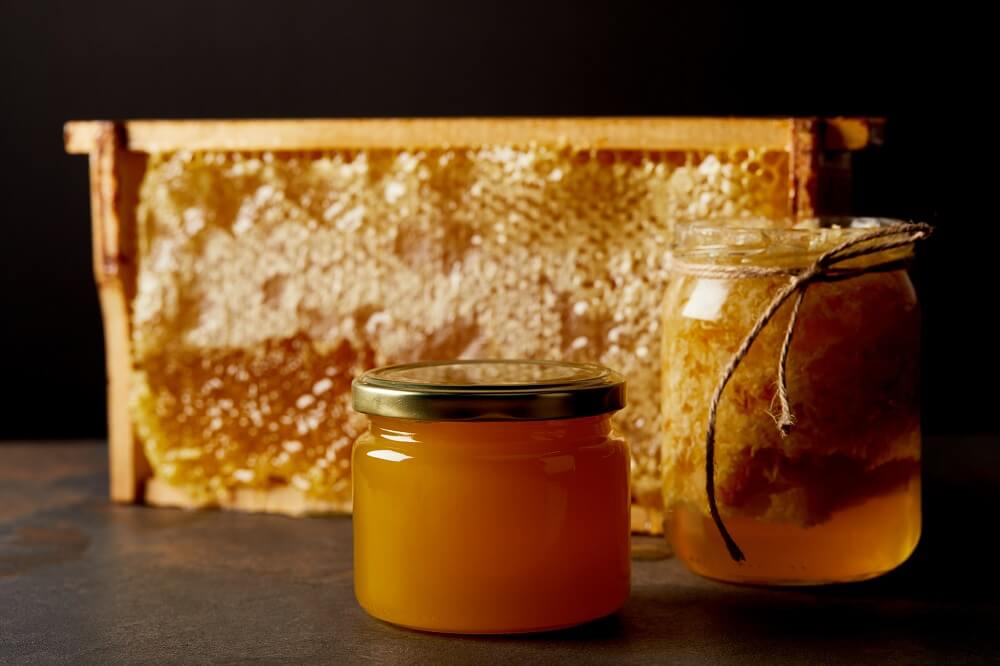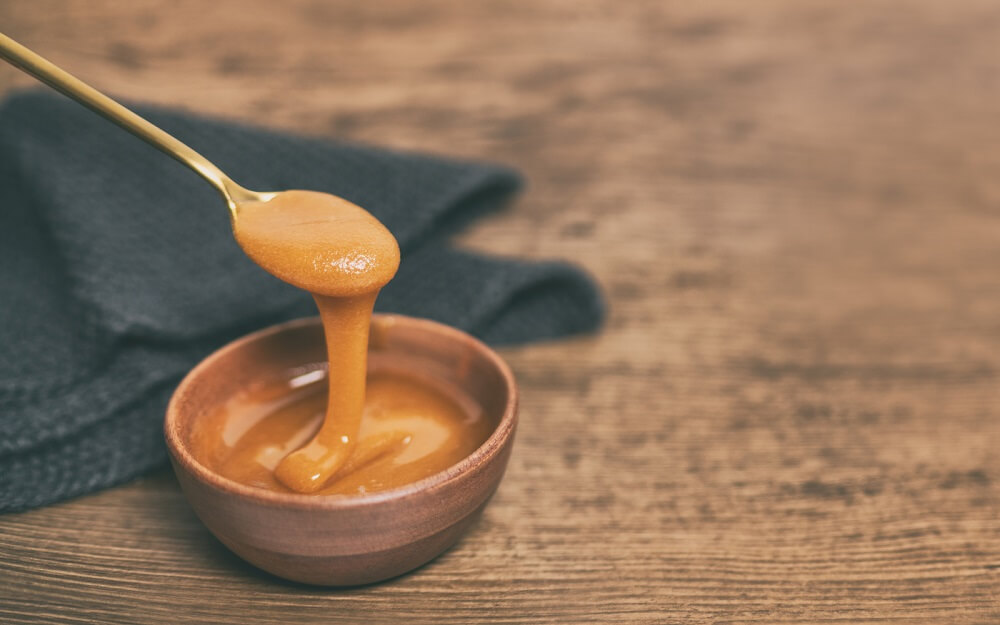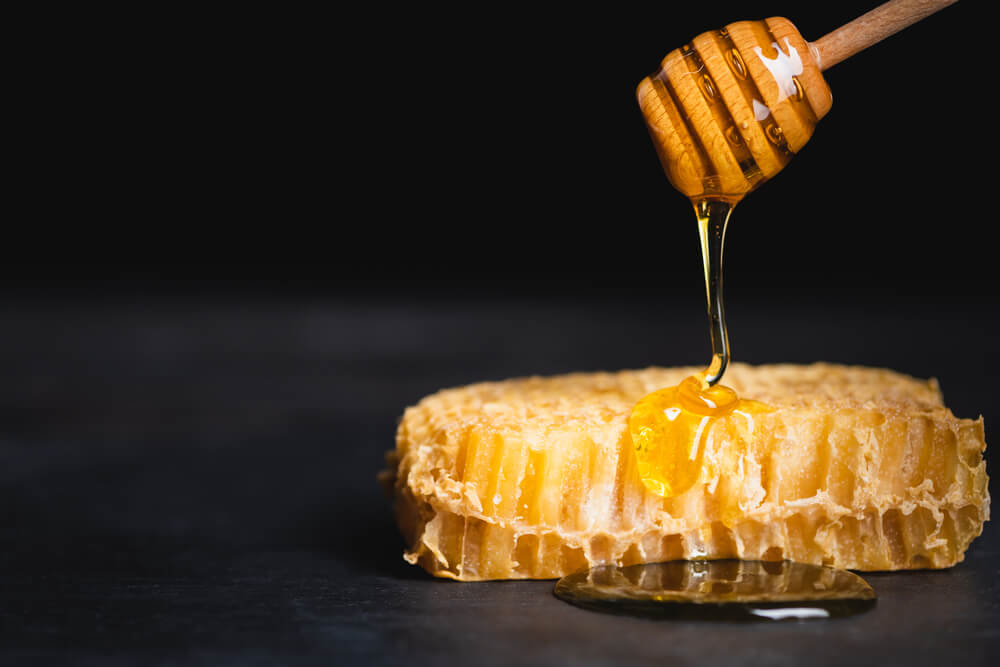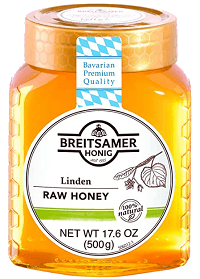What is Linden Honey?
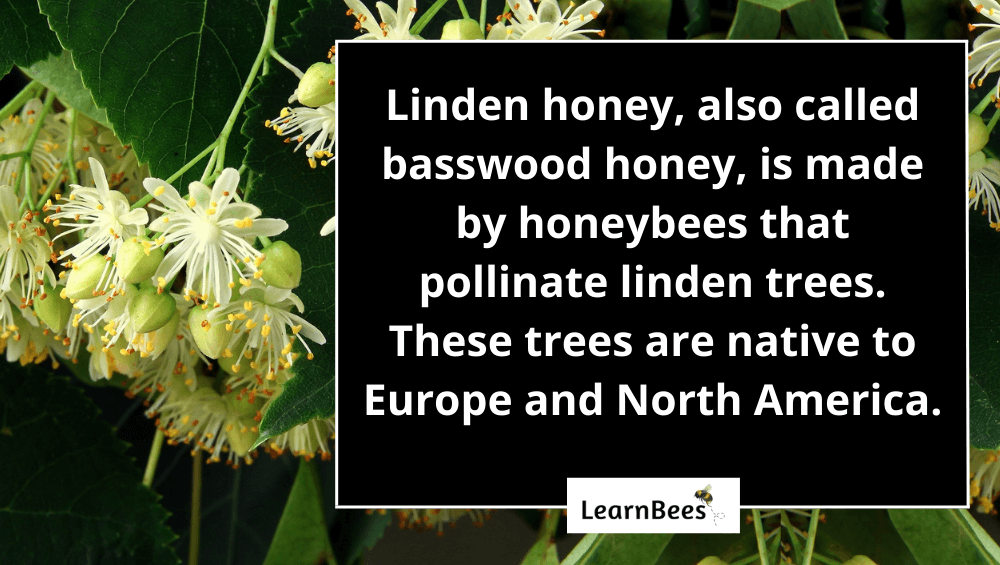
Linden honey, also known as basswood honey, is produced by honeybees that feed on linden trees.
Linden trees, also called basswoods, have fragrant blossoms that entice honeybees by the thousands. Linden trees produce delicate creamy white flowers that bloom in the late spring to summer.
Species of this beautiful shade tree are found in North America and Europe.(1)
And the secret’s out.
Linden honey is delicious.
It’s pleasantly sweet without being overpowering like some types of honey. Linden honey has woodsy and minty undertones with a touch of tartness. The texture is smooth and creamy, allowing it to spread easily on warm bread or waffles.
Linden honey also melts well into hot tea or coffee.
In a nutshell?
Raw linden honey tastes much better than processed grocery store honey.
But I should issue a quick honey disclaimer.
Honey is a superfood that’s chock-full of antioxidants and enzymes. But, raw honey is the only honey that contains these benefits – not the processed stuff you see in the cheap teddy bear containers.
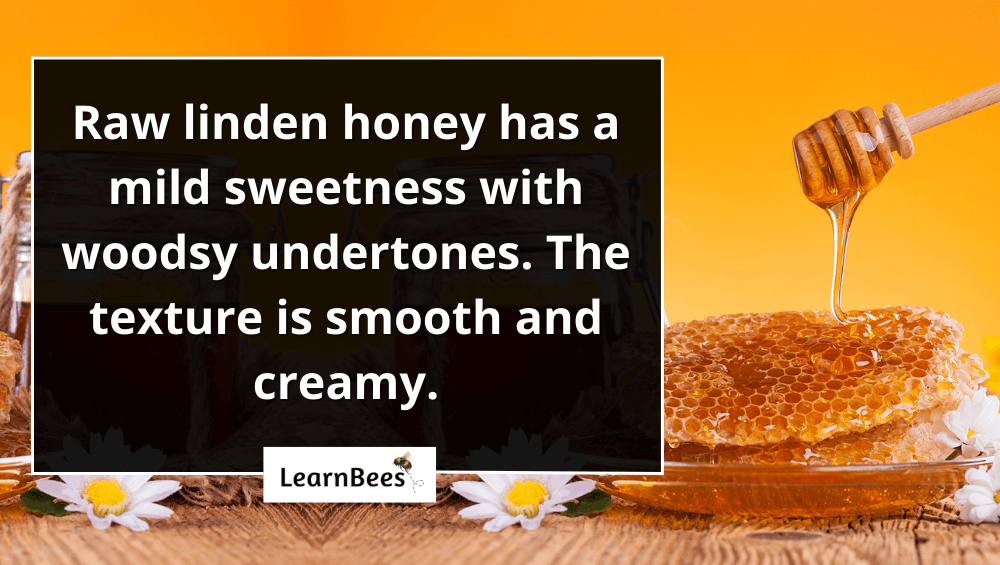
What is raw honey?
Raw honey is honey that hasn’t been heated or processed. It comes straight from the honeybee hive.
Why does this matter?
Because honey gets stripped of its nutrients when it’s overly pasteurized. Additionally, manufacturers dilute the honey with artificial sweeteners like high fructose corn syrup.(2, 3)
Honey processing cuts manufacturing costs, but it also reduces nutrients that allow the honey to treat coughs, sore throats, and skin wounds. This is why the FDA warns that overly processed honey is no longer considered real honey.(4)
Raw linden honey is different.
It hasn’t been heated, filtered, or diluted with other ingredients. It keeps all its nutrients because it’s left the way honeybees made it.
So here’s our recommendation:
If you want to enjoy both the taste and health benefits of honey, raw linden honey is the way to go.
And as a general rule?
Find honey labels that say “raw” on them. Avoid the processed stuff that comes from the grocery store.
What Are the Benefits of Linden Honey?
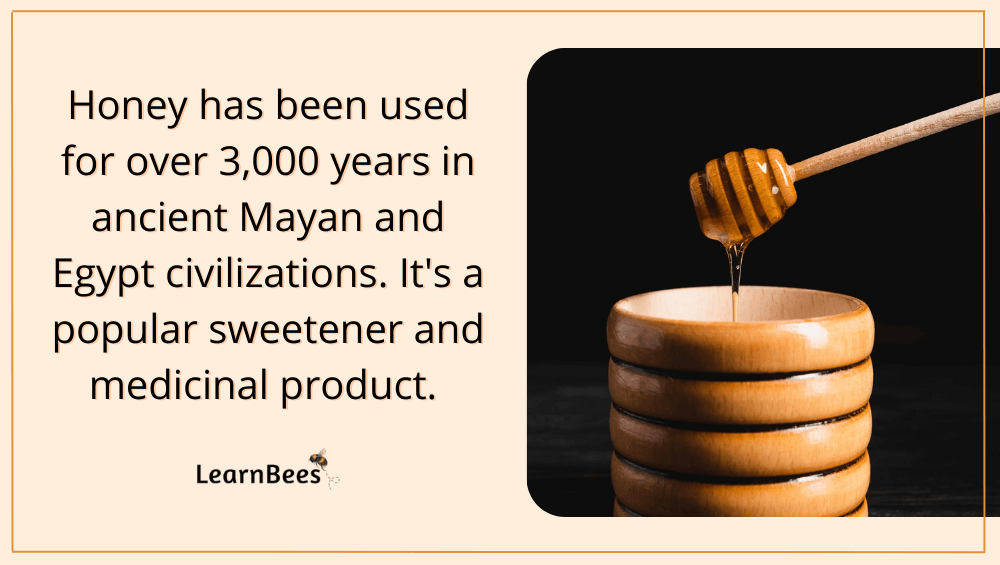
Linden Honey Nutrition
A single tablespoon of linden honey contains:
- Calories: 60 calories
- Protein: 0 grams
- Fat: 0 grams
- Carbs: 17 grams
- Sugars: 16 grams
So what are the linden honey benefits?
Let’s discuss a few:
Benefit 1: Raw Honey Has High Levels of Antioxidants
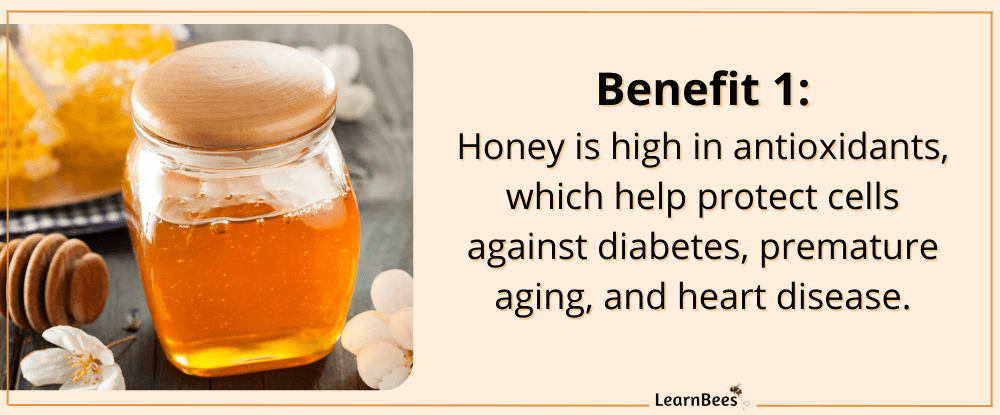
Honey contains antioxidants, including flavonoids and phenolic acids, which help the body defend itself against cell damage. Cell damage can lead to conditions such as heart disease, type 2 diabetes, and premature aging.(5)
Raw honey’s antioxidants have anti-inflammatory effects that have been shown to help fight various diseases linked to oxidative stress.(6)
Honey can also include pollen and bee propolis, providing additional health benefits. According to one study, raw honey may benefit the respiratory, gastrointestinal, cardiovascular, and nervous systems.(7)
Benefit 2: Raw Honey Can Be Used for Wound Care
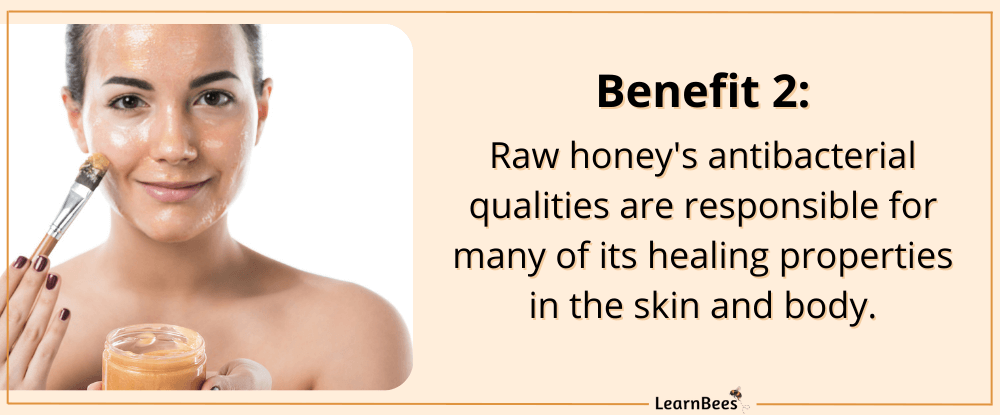
Thanks to its antibacterial, antifungal, and anti-inflammatory properties, honey has successfully treated wounds in clinical settings.(8, 9)
Honey was also found to help heal burns and sores that became infected after surgery.(10)
Honey has antimicrobial properties, according to a review of studies. Another study found that honey might inhibit microbes and help wounds heal.(11, 12)
The use of honey for treating diabetes-related foot ulcers has been substantial. Diabetic foot ulcers are serious and can lead to amputation.
According to one study, honey had a 43.3% success rate for treating individuals with diabetes-related foot ulcers. In other research, topical honey was found to heal 97% of participants’ diabetes-related ulcers.(13)
It’s also shown to be effective for other skin conditions, such as psoriasis and herpes.(14)
Benefit 3: Raw Honey May Be Good for Heart Health
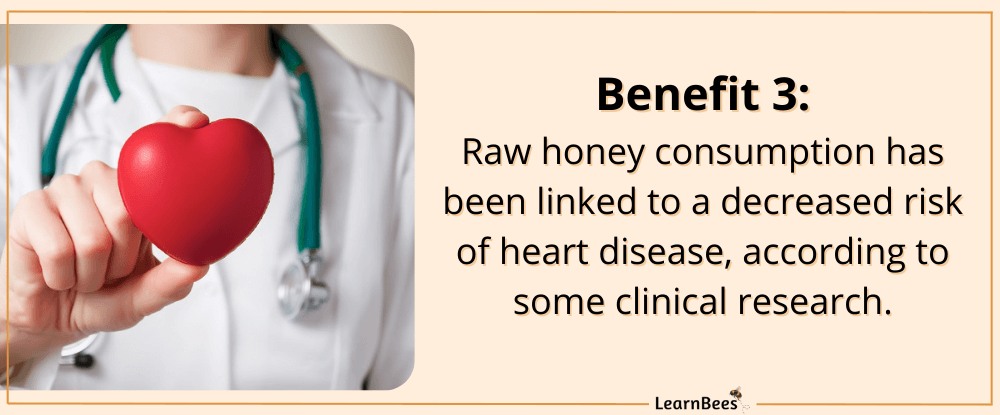
Raw honey has been found to aid in preventing heart disease in some studies.
Honey consumption has been linked to a decreased risk of high blood pressure in women, according to a study of 4,500 individuals.(15)
Some research shows that honey can improve blood fat levels, help regulate your heartbeat, and lower blood pressure. As a result, this can lead to improved heart health in the long term.(16)
Honey was also found in a rat study to help protect the heart against oxidative stress.(17)
Raw honey also contains propolis. Propolis is a resin that bees make from sap-producing trees. This substance can help lower cholesterol and triglycerides.(18)
Benefit 4: Raw Honey is an Effective Cough Remedy

Coughing is a common issue for people suffering from upper respiratory infections. Coughing fits can disrupt sleep for people suffering from these symptoms.
Fortunately, raw honey appears to be an effective substitute for traditional cough medications, with evidence indicating it works well.(19)
Honey was more effective than diphenhydramine (a cough medication ingredient) in suppressing cough symptoms, according to one study on honey and cough.(20)
Honey may also help reduce the duration of coughing fits. Honey is beneficial in the treatment of upper respiratory infections in several studies.(21)
According to additional research, honey might also improve the quality of sleep among children and their parents with coughs.(22)
Thankfully, honey does not have the same risk of side effects as some cough medications. That said, honey should not be given to infants under 12 months old since it could put them at risk for infant botulism.(23)
What Are the Risks of Linden Honey?
The good news is that honey is safe for most people. Most adults can consume both honey and honeycomb with little risk of a bad reaction.
So are there any side effects of linden honey?
Yes, there are two things to consider:
Risk 1: Raw Honey Isn’t Safe for Babies under 12 Months Old
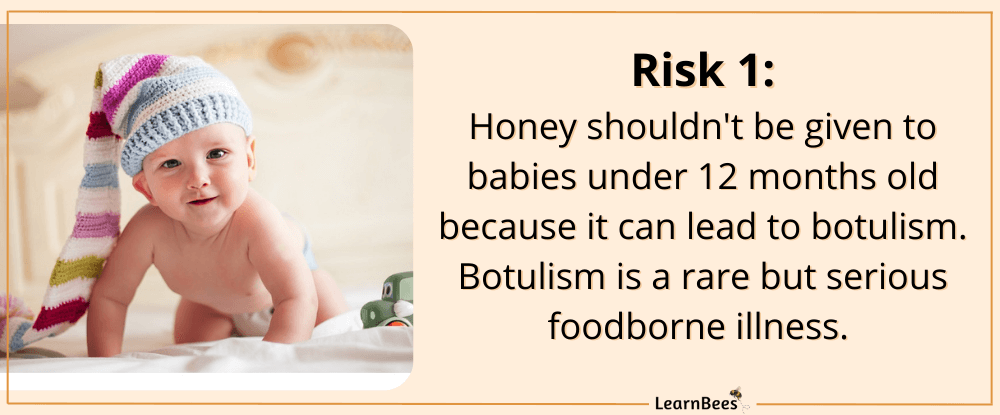
Children under the age of one can develop infant botulism by eating honey.
Botulism is a rare but sometimes deadly illness caused by the bacteria Clostridium botulinum. The condition can affect the nervous system and lead to paralysis or respiratory failure.
For this reason, it’s important never to give your child honey before they turn one year old. Their immune system isn’t strong enough to fight the bacteria that could potentially be present in raw honey.
Risk 2: People With Diabetes Should Eat Honey in Moderation

People with diabetes should eat honey in moderation since it does contain natural sugars. These sugars can cause a spike in blood sugar levels.
So although honey has health benefits, it’s important to remember that it does contain sugar and carbs. People with diabetes have to manage their carb intake carefully, especially while taking insulin.
If you have diabetes and want to eat honey, talk to your doctor and closely monitor your blood sugar levels.
FAQs on Linden Honey
- What color is linden honey?
- How do you take linden honey?
- Is linden honey safe?
- Is raw linden honey good for you?
- What does linden honey taste like?
- Where does linden honey come from?
- Is linden honey tea good?
- Is linden honey for skin beneficial?
- Where can I buy linden honey?
- Are linden trees good for honey bees?
- What’s the difference between linden honey vs. manuka honey?
- What’s the difference between acacia honey vs. linden honey?
- Is linden honey vegan?
What color is linden honey?
Linden honey is typically a light golden color. However, the exact shade can vary depending on the linden tree the honey is sourced from. Certain bottles of linden honey can be lightly golden with a green tinge.
—> Go back to the FAQs on linden honey
More to Explore:
- Can You Eat Beeswax?
- Honey For Allergies: Is it a Potential Cure?
- Fermented Honey With Ginger Recipe
How do you take linden honey?
You can take linden honey by the spoonful or add it to teas and other beverages. Some people also like to use it as a natural sweetener in recipes. Since linden honey has a mild sweetness, it pairs well with many baking recipes.
—> Go back to the FAQs on linden honey
More to Explore:
- What is Heather Honey?
- What is Goldenrod Honey?
- Allergic to Honey: Signs of a Honey Allergy + Treatment
Is linden honey safe?
Yes, linden honey is safe for most people. However, it’s important to note that raw honey isn’t safe for babies under 12 months old. This is because raw honey can contain bacteria that lead to infant botulism.
Infant botulism is a rare but sometimes deadly illness caused by the bacteria Clostridium botulinum. Thankfully, once children are older than 12 months old, they can safely enjoy the benefits of honey.
Honey should also be eaten in moderation by people with diabetes. It can cause blood sugar levels to rise in the same way table sugar does.
—> Go back to the FAQs on linden honey
More to Explore:
Is raw linden honey good for you?
People often ask:
What is linden honey good for? What are the linden honey benefits? Is linden honey better?
Research shows that honey has many benefits for our overall health. Some of the potential benefits of raw linden honey include:
- Honey has anti-inflammatory and antibacterial properties that can heal wounds such as burns or scrapes
- Honey can help soothe a sore throat and cough
- Honey can promote overall heart health by lowering blood pressure and regulating the heartbeat
—> Go back to the FAQs on linden honey
More to Explore:
What does linden honey taste like?
People regularly ask:
What does linden tree honey taste like? Is linden honey sweet?
Linden honey’s taste is mildly sweet with mint and woodsy undertones. Linden honey isn’t as sweet as some other types of honey, such as tupelo honey. That said, linden honey is unique and delicious with various foods such as warm biscuits, toast, or oatmeal.
—> Go back to the FAQs on linden honey
More to Explore:
- The Top 3 Best Manuka Honey Brands
- Orange Blossom Honey: Uses, Benefits, & Risks
- Sourwood Honey: Uses, Benefits, & Risks
Where does linden honey come from? What is linden tree honey?
Linden tree honey, also called basswood honey, is made by bees that collect nectar from the flowers of the linden tree. Linden trees are native to Europe and North America.
They have heart-shaped leaves and small, yellowish-white flowers that bloom in the late spring to summer. Honeybees are attracted to the flowers’ sweet fragrance and nectar.
As a result, honeybees collect the nectar and then bring it back to their hives. Once the nectar is in the hive, bees mix it with enzymes in their saliva. After that, bees fan their wings inside the hive to evaporate water from the nectar.
Once the water has evaporated, the nectar becomes honey stored in the honeycomb. Honey is what honeybees eat during the winter when no flowers are blooming.
—> Go back to the FAQs on linden honey
More to Explore:
Is linden honey tea good?
Linden honey tea is a delicious way to enjoy it. Simply add a spoonful of linden honey to a cup of hot tea.
You can also add other ingredients such as lemon or ginger for added flavor. Some people like to add linden honey to chamomile tea for a soothing bedtime drink.
—> Go back to the FAQs on linden honey
More to Explore:
- The Brutally Honest Truth About Sour Honey
- Buckwheat Honey: Uses, Benefits, & Risks
- Can You Eat Honeycombs?
Is linden honey for skin beneficial?
Yes, raw linden honey contains vitamins, minerals, and antioxidants that can benefit your skin.
When applied topically, raw linden honey can help to:
- Soothe inflammation and reduce redness
- Moisturize skin and relieve pain
- Fight against harmful bacteria that can lead to infections
With that in mind, it’s essential to use raw honey on your skin. This is because raw honey hasn’t been processed like commercial honey, so it still contains all of the beneficial enzymes and nutrients.
—> Go back to the FAQs on linden honey
More to Explore:
Where can I buy linden honey?
If you’re in North America or Europe, check with your local beekeeper to see if they sell raw linden honey. If not, you can buy raw linden honey online.
—> Go back to the FAQs on linden honey
More to Explore:
Are linden trees good for honey bees?
Yes, linden trees are an essential source of food for honey bees. Linden trees provide nectar and pollen for bees, which is necessary for their survival. Honeybees are drawn to the fragrant flowers of the linden tree, and they use that nectar to make delicious honey.
—> Go back to the FAQs on linden honey
More to Explore:
What’s the difference between linden honey vs. manuka honey?
The main difference between them is the taste and color. Besides that, there hasn’t been scientific research comparing the two. So we don’t know if one is better than the other in terms of health benefits.
Manuka honey is much more expensive because it only comes from manuka trees in New Zealand.
However, that doesn’t mean manuka honey is necessarily better than other types of honey. Raw honey, in general, is full of antioxidants and enzymes, which offer numerous health benefits.
—> Go back to the FAQs on linden honey
More to Explore:
- What is Leatherwood Honey?
- What is Blueberry Honey?
- Allergic to Honey: Signs of a Honey Allergy + Treatment
What’s the difference between acacia honey vs. linden honey?
The two types of honey taste differently. Acacia honey has a medium sweetness with vanilla undertones. On the other hand, linden honey is mildly sweet with woodsy and mint undertones.
Aside from that, there is no medical research comparing linden honey to acacia honey. This means we can’t declare if one type of honey has more health benefits than the other.
With that in mind, acacia honey is a popular type of honey more commonly found than linden honey.
—> Go back to the FAQs on linden honey
More to Explore:
Is linden honey vegan?
No. No type of honey is considered vegan because honeybees make it. Vegans don’t consume animal products.
